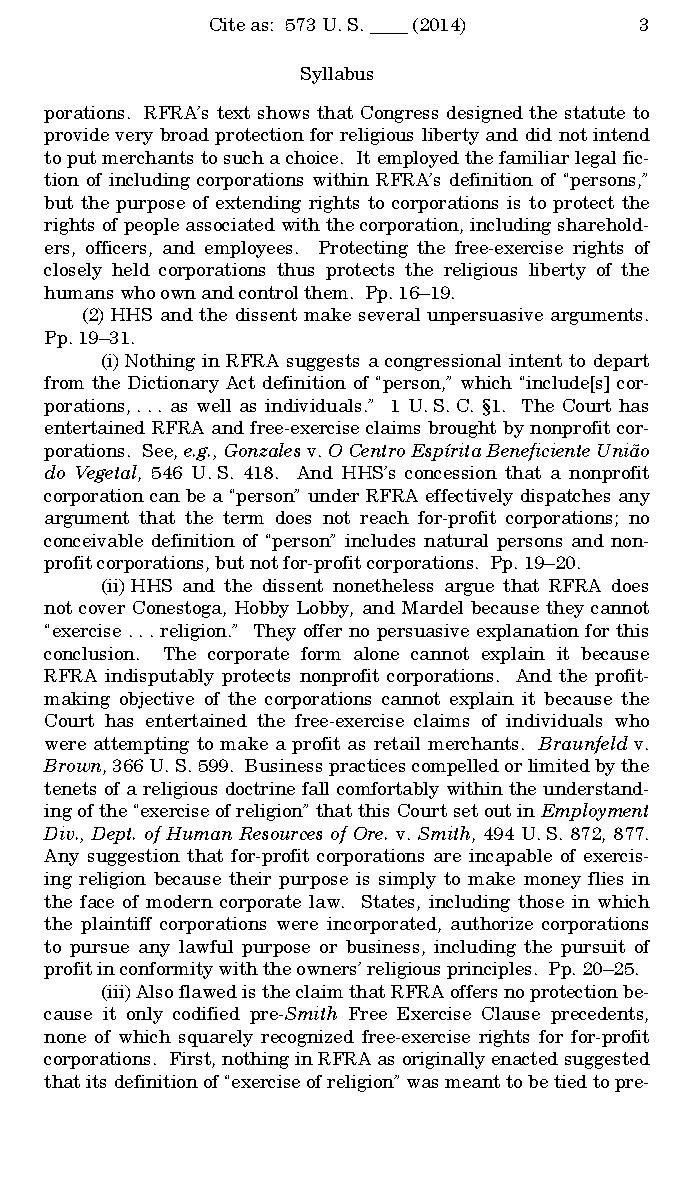Syllabus
porations. RFRA's text shows that Congress designed the statute to provide very broad protection for religious liberty and did not intend to put merchants to such a choice. It employed the familiar legal fiction of including corporations within RFRA's definition of "persons," but the purpose of extending rights to corporations is to protect the rights of people associated with the corporation, including shareholders, officers, and employees. Protecting the free- exercise rights of closely held corporations thus protects the religious liberty of the humans who own and control them. Pp. 16–19.
(2) HHS and the dissent make several unpersuasive arguments. Pp. 19–31.
(i) Nothing in RFRA suggests a congressional intent to depart from the Dictionary Act definition of "person," which "include[s] corporations,... as well as individuals." 1 U. S. C. §1. The Court has entertained RFRA and free-exercise claims brought by nonprofit corporations. See, e.g., Gonzales v. O Centro Espírita Beneficiente União do Vegetal, 546 U. S. 418. And HHS's concession that a nonprofit corporation can be a "person" under RFRA effectively dispatches any argument that the term does not reach for-profit corporations; no conceivable definition of "person" includes natural persons and nonprofit corporations, but not for-profit corporations. Pp. 19–20.
(ii) HHS and the dissent nonetheless argue that RFRA does not cover Conestoga, Hobby Lobby, and Mardel because they cannot "exercise... religion." They offer no persuasive explanation for this conclusion. The corporate form alone cannot explain it because RFRA indisputably protects nonprofit corporations. And the profit-making objective of the corporations cannot explain it because the Court has entertained the free-exercise claims of individuals who were attempting to make a profit as retail merchants. Braunfeld v. Brown, 366 U. S. 599. Business practices compelled or limited by the tenets of a religious doctrine fall comfortably within the understanding of the "exercise of religion" that this Court set out in Employment Div., Dept. of Human Resources of Ore. v. Smith, 494 U. S. 872, 877. Any suggestion that for-profit corporations are incapable of exercising religion because their purpose is simply to make money flies in the face of modern corporate law. States, including those in which the plaintiff corporations were incorporated, authorize corporations to pursue any lawful purpose or business, including the pursuit of profit in conformity with the owners' religious principles. Pp. 20–25.
(iii) Also flawed is the claim that RFRA offers no protection because it only codified pre-Smith Free Exercise Clause precedents, none of which squarely recognized free-exercise rights for for-profit corporations. First, nothing in RFRA as originally enacted suggested that its definition of "exercise of religion" was meant to be tied to pre-
